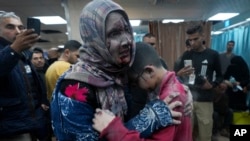As Israel’s bombing campaign against Hamas in Gaza takes an ever-heavier toll in lives lost and as basic survival commodities become ever scarcer, the international drumbeat for a cessation of hostilities in the beleaguered Palestinian territory is getting louder.
It has been two months since the attacks on Israel by U.S.-designated terror group Hamas that killed more than 1,200 Israelis and foreign nationals, mostly civilians, among them hundreds of young people who were slaughtered while attending a music festival.
It has been two months since more than 240 hostages were snatched and spirited to Gaza, where they reportedly have languished in abysmal conditions.
“But it is almost two months since the start of Israel’s campaign, not only in self-defense against Hamas and armed groups, but against the whole population of Gaza,” said Christian Lindmeier, World Health Organization spokesperson, in unusually blunt remarks.
Speaking Friday in Geneva, Lindmeier accused Israel of conducting “a campaign against innocent civilians — women, children and men that have been targeted since the last two months.”
“It is cutting off Gaza from water, food, anything which is necessary for any sort of life,” he said, noting that conditions for millions of people who are being pushed into ever smaller, overcrowded areas further south, in what had once been called safe zones, were becoming “more and more horrible by the day.”
Israel maintains that it is doing its best to focus its fire only on legitimate Hamas targets but that the group has deliberately placed its military and administrative assets amid the civilian population, effectively using the people as human shields.
Lindmeier said WHO’s staff in Gaza describe horrific scenarios of children begging, crying for water.
“We are at that level where most normal and basic supplies are not available anymore,” he said.
The WHO spokesman noted that people were receiving less than two liters of water per day instead of the seven liters per person per day needed to fulfill their basic needs. “And that is water for everything, not only for drinking,” he said.
“We also have scenarios that describe people starting to cut down telephone poles to have a little bit of firewood still to keep warm, to maybe cook if they have anything available,” he said. “So, we are at that level where really the civilization is about to break down.”
Since the temporary cease-fire ended and Israel resumed its bombing campaign on December 1, U.N. humanitarian agencies report more than 2,000 Palestinians have been killed, bringing the total number of deaths to at least 17,000.
They report 70% of the victims are women and children, of whom at least 7,200 are children.
Commenting on the situation in Gaza Thursday, U.N. Relief Coordinator Martin Griffiths said, “Enough is enough. The fighting must stop.
“The humanitarian system is on the verge of collapse. We must avoid such an outcome at all costs,” he said.
UNRWA, the U.N. relief and works agency for Palestinian refugees, warns that the conflict is posing very real threats to international peace and security as well as the lives of nearly the entire population in Gaza.
In a letter sent Thursday to the president of the U.N. General Assembly, UNRWA Commissioner-General Philippe Lazzarini said his agency’s ability to continue delivering its mandate in Gaza “has now become very limited.”
“With constant bombardment, low and irregular flow of food and other humanitarian supplies into the Gaza Strip compared to the immense needs of displaced people in our overcrowded shelters and outside, UNRWA’s ability to assist and protect people is reducing fast,” he said.
WHO spokesman Lindmeier said that WHO convoys carrying food, water and medical supplies have been stopped from entering Gaza more than once and that Friday’s operation to bring medical supplies to the north and evacuate 12 patients to the south for medical treatment had been suspended.
“The situation in Gaza is beyond belief,” he said. “The health system is on its knees,” and the south could experience the same fate as the north.
“Gaza cannot afford to lose a single hospital or any single hospital bed. … Patients are bleeding on the floor. Trauma yards resemble battle fields,” said Lindmeier.
“This must end. This callousness must end,” he said. “We need a cease-fire, and we need it now.”











